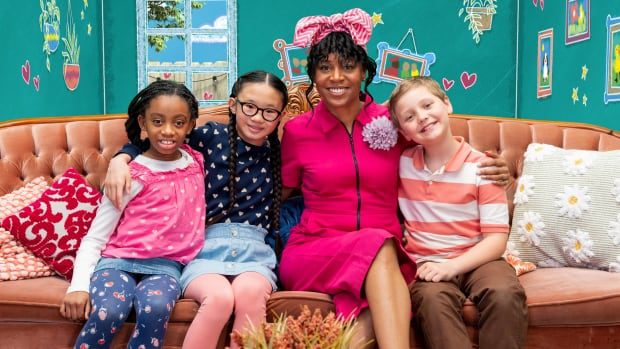Global Courant 2023-05-19 13:00:00
A new children’s show about growing up in the foster care system will debut this fall, following the recent filming in Toronto.
Aunty B’s House by Khalilah Brooks follows a foster mother and her crew of foster children as they work through difficult topics such as losing a parent and entering the foster care system. But the show, intended for a preschool audience, does it with humor.
The show is structured like a sitcom with ’90s guitar riffs and kid-friendly punchlines – with the goal of helping all kids understand that families come in different shapes and sizes.
“One of the episodes we have is about a kid saying, ‘This isn’t a real family.’ So we have those tough topics. Those are topics that I personally went through[with]a lot of other kids who are currently or have been raised in the foster care system in the past,” Brooks said.
She created the show and stars as Aunty B.
Brooks drew on her own experience growing up in the foster care system in Nova Scotia to create the character.
At the time, she saw families on TV, but felt like they weren’t telling her story.
“There was an emotional disconnect, and there was also a little yearning, because that’s what I wanted. I thought that’s what family really was. But as life turned out, it’s not,” Brooks said.
“How can we have the heart and the humor?”
As a child, she remembers being embarrassed about “standing out” – for being too tall and showing up in new communities and schools with foster siblings.
“Maybe I haven’t brushed my hair. I may not have brushed my teeth. Because when you’re that young, you don’t have those life skills or those hygiene skills,” she explained.
That led to a great lack of confidence. Brooks wanted to hide, but she says one foster parent in particular changed everything for her.
“She taught me to stand tall and hold my head up and that I shouldn’t be ashamed of my journey and the fact that I was a foster child and that she would teach me how to be loved, which is exactly what did she do,” she said. Brooks left the foster care system at age 21.
Khalilah Brooks and the foster mother (left) who made a huge difference in her life. Brooks says she remembers arriving at her foster mother’s home for the first time and being greeted with ease and love. (Submitted by Khalilah Brooks)
Now she wants to be that reassuring foster parent for other kids and does so with a TV show shot entirely in a studio in Toronto with a cast of young children playing her foster children.
Brooks did live shows as her character Aunty B in Nova Scotia before taking her idea to a pitch session at Centennial College.
In the audience were producers Michelle Melanson and Ken Cuperus, who own a production company in Toronto and immediately knew they wanted to make the show.
Melanson and her husband have their own connections to the foster care system. They adopted their child from the foster care system when she was 11 months old, and Cuperus herself was adopted at a young age.
“We sat down with Khalilah in the writers’ room, and she gave us all these great anecdotes from when she was a kid, and then we could turn that into, ‘Okay, what’s the situational comedy in this? And how can we have the heart and the humor?'” said Melanson, who is now the executive producer of Aunty B’s House.
Khalilah Brooks played Aunty B as a live character on the East Coast before pitching her idea to TV producers at an event at her college. Now, Aunty B’s House will debut its first season this fall. (Submitted by Khalilah Brooks)
It’s okay to be sad
Showrunner Kara Harun says Aunty B’s House is about a different kind of representation: showing foster kids that they’re normal and that their family matters, but also that family can be whatever you make it.
It is also about teaching empathy to children who do not grow up in foster care.
“I think it’s really important to introduce them to what we adults consider to be more difficult situations and present them in a very normal way so that they realize that, you know, their situation might not be the same as theirs. someone else, but they can have empathy and compassion,” Harun said.
Episodes feature stories about how the tooth fairy finds a recently moved foster child, how to deal with the nervousness and anxiety surrounding a visit to a relative – and how to deal with the grief that sometimes comes during that visit. In another, a child won’t part with her shoes, the last pair her mother bought before her death.
Melanson says North American audiences have never seen anything like it before, but children’s shows that deal with darker subjects, such as parental deaths, do exist in Scandinavia. And, she says, it’s getting closer to the reality children live in.
“Kids get upset. Kids don’t understand. Kids are confused. I think we can all present that in a way that’s still appropriate for preschoolers, but let kids know it’s okay to have those emotions, except for the rosy, happy things,” Melanson said, adding that the show brought in a consultant from the Children’s Aid Society to make sure the stories were consistent with children’s experiences in care.
Michelle Melanson (right) is the executive producer of Aunty B’s House. Together with her husband Ken Cuperus (left) she runs a production company. The couple has multiple touchstones for the foster care system. “We even went to China and adopted our daughter (bottom center), and she was in the shelter system when we got her at age 11,” Melanson said. (Submitted by Michelle Melanson)
Actor Luke Dietz plays a boy named Zachary whose parents died in infancy and whose grandparents ultimately couldn’t care for him because of their age.
Then Zachary finds Aunt B’s house.
Dietz says the show has helped him understand that there’s always someone to take care of you.
“Aunt B is always there for you. As in every episode, someone is busy with something, but she always helps them,” said Dietz.
Shortage of foster parents
Daria Allan-Ebron directs Family and Children’s Services of Guelph and Wellington County.
She hopes the show will help with the isolation children in shelters can feel.
“I think it gives children and young people an opportunity to see some of their experiences that they may have had exactly the same or similar to what is portrayed on Aunty B’s show in a way that they can probably relate to,” said Allan-Ebron.
“Some may not be aware that other children or young people have had similar experiences.”
Right now, her community is facing a shortage of foster parents, especially Black and Indigenous foster parents and those willing to take in groups of siblings.
She said there seems to be a turnover at the moment with some foster homes and carers retiring.
“Foster carers really play such an important role in the lives of children who come to live with them. They’re there to meet their physical needs, their social needs, their emotional needs,” says Allan-Ebron. “They are some of the most compassionate, kind, warm, nurturing people I’ve met, and they make a significant difference in the lives of children and young people.”
That’s something Brooks knows firsthand and wants to celebrate and help people understand in her new show, in addition to creating a strong sense of belonging for kids going through an incredibly difficult time.
“The fact is their stories aren’t being told, and so this show is about inspiring kids,” said Brooks.
“Even though the topics are tough, it’s about being able to let them know that even in difficult conversations, there’s someone to listen and someone to see them through.”
You can watch Aunty B’s House this fall on CBC and CBC Gem.
For more stories about the experiences of Black Canadians – from anti-Black racism to success stories within the Black community – check out Being Black in Canada, a CBC project that Black Canadians can be proud of. You can read more stories here.
(CBC)




